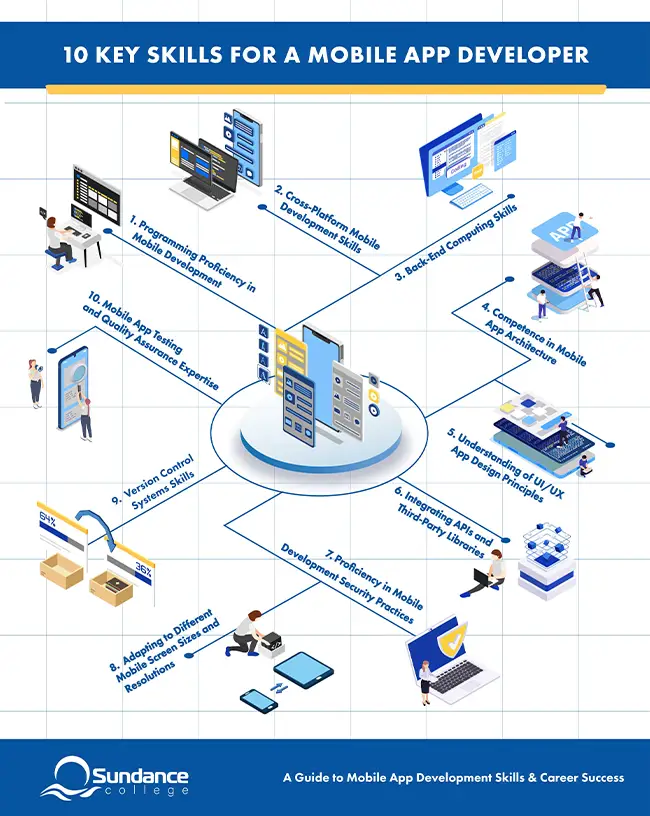Blog / A Guide to Mobile App Development Skills & Career Success
A Guide to Mobile App Development Skills & Career Success

Mobile and Web Developer Diploma
- Web Designer
- Mobile App Developer
- Web Developer
- Software Developer
Table of Contents
Did you know that Canada is set to welcome 2 million new mobile phone users in the next 5 years? Additionally, e-commerce payments via mobile phones are expected to rise to 42% by 2026, up from 37% in 2022.
With these projections, Canadian companies are increasingly keen on developing and refining mobile apps for their businesses. And to achieve their business objectives, they are actively seeking skilled mobile app developers.
To become a sought-after developer, you need to understand the key skills a mobile app developer requires to give them a competitive edge. This guide is here to help pave your way to success.
Read on to find out the capabilities you need, as well as where you can learn and practice mobile application development skills and the role of Sundance College’s Mobile and Web Development Diploma program in your career journey.
Prefer to listen? We’ve adapted our blog into audio format so you can listen on the go.
Listen to “A Guide to Mobile App Development Skills & Career Success”
Essential Skills for Mobile App Developers
Mobile app development requires a specific set of skills to create functional and user-friendly applications that meet the needs of modern users. Here are some fundamental technical skills for mobile app developers:
Programming Proficiency In Mobile Development
Mobile app development relies heavily on proficiency in programming languages tailored to specific platforms.
For Android development, mastery of Java and Kotlin programming languages is essential, with Kotlin gaining traction for its modern features and compatibility with existing Java codebases. iOS developers need expertise in Swift programming language, renowned for its performance and safety features.
Other programming languages to become familiar with include:
- JavaScript programming to create dynamic and interactive mobile applications that run seamlessly across different platforms.
- HTML and CSS are used for hybrid app development. These coding languages provide the foundation for creating visually appealing and responsive user interface designs in mobile applications.
- C# is a versatile programming language commonly used for creating native applications on the Microsoft Windows platform. Its robust features and integration with the .NET framework make it suitable for building high-performance and scalable mobile applications.
- Android Jetpack Compose is a collection of modern tools and libraries provided by Google to simplify app development for Android. It offers a modern UI (user interface) toolkit that allows developers to build native user interfaces for mobile apps.
Mastery of other programming languages can be an asset for you when applying to mobile app programming jobs.
Cross-Platform Development Skills

Mastery of cross-platform frameworks like jQuery Mobile, Node.js, and JSON empowers developers to create apps that seamlessly function across multiple platforms. Proficient cross-platform developers can efficiently build a single codebase app, saving time and money for businesses.
Back-End Computing Skills
Understanding back-end computing concepts enables developers to identify and address system issues before they impact users. Key back-end concepts include framework design, database management, hardware interaction, and security measures to safeguard user data.
It’s important to be well-versed in SQL (Structured Query Language) programming language for managing and querying databases in mobile applications. It will allow you to store, retrieve, and manipulate data within mobile apps.
Competence In Mobile App Architecture
Understanding mobile app architecture is crucial for developing scalable, maintainable, and robust applications. Developers must grasp architectural patterns like MVC (Model-View-Controller) and MVVM (Model-View-View-Model) to organize code effectively, improve code reusability, and enhance the overall stability and performance of mobile applications.
Understanding Mobile App Design Principles
Knowing user interface (UI) and user experience (UX) design principles allows you to create visually appealing and user-friendly mobile applications. A well-designed interface enhances user satisfaction, encourages exploration, and fosters repeat usage. Mobile app developers must focus on creating a cohesive and intuitive user experience while ensuring the app’s visual elements and design align with user preferences.

Third-Party Libraries And API Integration Skills
Proficiency in integrating Application Programming Interfaces (APIs) extends app functionality, enabling features like social media logins, payment processing, and real-time data access. Mobile developers must possess skills in reading and interpreting API documentation, implementing authentication methods, handling API errors, and managing asynchronous programming for non-blocking API calls.
Proficiency In Mobile App Security Practices
Prioritizing security is a must for mobile developers. This skill encompasses encryption, authentication, and data protection to safeguard user information and privacy. As a mobile developer, you must stay updated on the latest security threats and incorporate robust security measures into your app development process to mitigate risks.
Adapting To Different Mobile Screen Sizes And Resolutions
Optimizing app performance for different devices enhances user satisfaction and app success. Developers must possess skills in responsive design principles, minimizing load times, reducing app size, and optimizing resource usage to deliver a smooth user-friendly experience across various screen sizes and resolutions.
Version Control Systems Skills
Knowledge of version control systems like Git is essential for mobile app developers to track changes, collaborate efficiently, and maintain code consistency and safety. Version control systems facilitate seamless collaboration among team members, enable tracking of code changes, and provide mechanisms for code review and rollback. Proficiency in using Git commands, branching strategies, and merging techniques ensures smooth and organized development workflows, enhancing code quality and project management.
Mobile App Testing And Quality Assurance Expertise
Rigorous testing and quality assurance processes are essential for ensuring app reliability, performance, and overall quality. As a mobile app developer, you need to conduct thorough testing across various platforms and screen sizes to identify and rectify issues before deployment, thereby enhancing user satisfaction and reducing support requests.

What Employers Look for in Mobile App Developers
When applying for mobile app developer positions, you will want to know what employers are looking for in potential candidates. Here’s 5 key things you should keep in mind:
Technical Competence
Ensure your resume and portfolio highlight experience in the specific platform (iOS, Android) and mobile app coding languages (e.g., Swift, Java, Kotlin) required for the job. Employers prioritize candidates with relevant experience who can hit the ground running.
Relevant Projects
Highlight projects in your portfolio that align with the job requirements, including the scope, complexity, and industry relevance. Demonstrating experience tackling similar challenges will make you a more attractive candidate.
Usability And Design
Showcase examples of apps (not necessarily built by yourself – just any apps available on the app stores) that you think have intuitive user interfaces, effective user experience optimization, and adherence to design principles. Employers highly appreciate developers who prioritize usability and design to create engaging and user-friendly applications.
Additional Skills
There are additional skill sets beyond technical expertise that can distinguish you from other candidates. These include:
- Project Management Abilities: Employers look for developers who can prioritize tasks, set realistic goals, and manage resources efficiently.
- Adaptability: Employers look for mobile app developers who can quickly learn new skills, embrace change, and thrive in dynamic work environments, contributing to the continuous improvement and innovation of mobile app development processes.
- Problem-Solving: Employers seek developers who can analyze issues systematically, think critically, and propose innovative solutions, ultimately enhancing the functionality and performance of mobile applications.
- Creativity: Employers value developers who can think outside the box, brainstorm innovative ideas, and deliver unique and user-centric solutions that captivate and delight users.
Testimonials Or References
Include testimonials or references from previous clients or colleagues to validate your skills and professionalism. Having endorsements from others in the industry can significantly strengthen your candidacy.
You might be thinking, “That sounds great, but how can I showcase a portfolio with relevant projects and testimonials when I’m just entering the software development workforce?” Keep reading – the answer is in the next section.
Where to Learn and Practice Mobile App Development Skills

Did you know a well-designed web and mobile development diploma program emphasizing hands-on learning and practicum placement can help you gain relevant knowledge and skills, build up the first projects for your portfolio, and significantly impact your journey to success in mobile app development?
Consider web development alongside mobile development. Mastering both provides a well-rounded understanding of software development, giving you a head start over other candidates. And there are even more benefits to explore.
For example, Sundance College’s Mobile and Web Development Diploma program offers numerous benefits tailored to aspiring developers.
This 60-week program covers relevant mobile app development courses, including Android, iOS, and cross-platform development. The program also includes front-end and back-end development courses in web development. Taking this program means you will have everything you need to land your first job as a mobile app developer and excel in the IT field.
Take the first step towards a rewarding career in mobile development – and web development – by filling in our contact form today. Hurry, as there are limited spots available for this program!
Related Blogs
Subscribe for more career advice
Blog Categories
Share on:
